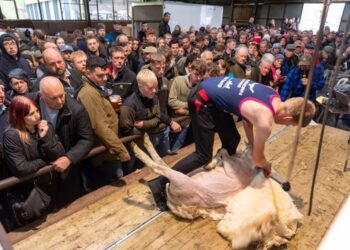
A bid to encourage older farmers to retire to make way for fresh blood in the industry has been revealed by the Government and farmers are urged to make sure they have their say.
The plans, which are now out for consultation for 12 weeks, would see a lump sum paid to farmers to allow them to leave.
The Government hopes that this will make way for new entrants into the industry and allow older farmers to ‘retire with dignity’.
Tenant Farmers Association national vice-chairman, Robert Martin, a dairy farmer from Dalston near Carlisle, said: “Whilst it is disappointing that DEFRA has reduced its aspiration for the lump sum scheme by focusing it only on retirement rather than reinvestment, the TFA still believes it could benefit a number within the farming industry.
“Owner occupiers approaching retirement without successors can take part in the scheme and retain ownership of their land but rent it out to new entrants and progressive farmers.
“Whilst DEFRA has set a minimum five-year minimum term on such leases, TFA would prefer the term to be 10 years.
“Tenants who can negotiate surrender deals with their landlords and those with succession tenancies with successors waiting in the wings, could also benefit from the scheme.”
The Government said: “A vibrant farming industry also needs to attract new talent and create more opportunities for new entrants and farmers wishing to expand their businesses.
“The Government is working together with industry leaders, local councils, land owners and new entrants to co-design a scheme to create real opportunities for new farming businesses.
“The new scheme will be available to support new entrants from 2022.
“Recommendations for the design of the scheme will be shared later in the year.”
Environment Secretary George Eustice said: “We need to address the twin challenges of helping new entrants fulfil their dream and gain access to land, while also helping an older generation retire with dignity.
“Our exit scheme will offer farmers who want to exit the industry all of the area payments they would likely have received until the end of the transition period in a single lump sum.
“It gives them a real incentive to confront what can often be a difficult decision and will help them clear bills and settle debts.”
Rob Hitch, a partner with accountants Dodd & Co, Penrith, said: “One good things is that this is something that’s been asked for, but the detail will be the issue.
“We know there’s a cut-off for payments at the top, but will there be one at the bottom end?
“Most farmers would probably get around £50,000, but would that be enough to get them to retire? How will the payments be taxed?
“It might well be attractive to a lot of smaller farmers in this area, but until there’s more information we won’t know.”
NFU Cumbria county chairman Ian Bowness said: “The NFU wants to see a domestic agricultural policy that allows farm businesses to thrive, rewarding them for both the safe, traceable and affordable food they produce for the nation and their extensive work caring for the countryside.
“As our agricultural support is overhauled, farm businesses across the country will be making life-changing decisions about the future of their farm or tenancy.
“We want to see a fair transition which allows farmers who are considering leaving the industry to have sufficient time and information to make those significant decisions.
“We must also recognise the personal nature of this decision and how no two farm businesses are the same, meaning each set of circumstances for a farmer considering a lump sum exit payment will be truly unique.
“We will now be consulting with our members extensively to understand their views on these proposals.
“Of course, any discussion around people exiting the industry must be coupled with how we attract new people into agriculture.
“It’s crucial that the schemes announced today work in a coherent way with schemes such as the New Entrant Scheme and Future Farm Resilience Fund to ensure British farming has a thriving workforce for generations to come.
“While getting the framework of future agricultural policy schemes right is important, DEFRA’s policy transition must not ignore the consequences of the Government’s new trade deals as these will be absolutely critical to the viability of many family farms. Trade and policy must act in tandem.”
Veronica Waller, senior project manager for the Farmer Network, added: “We have been waiting for some time to learn DEFRA’s thoughts on the retirement scheme and the delinking proposal.
“We would urge farmers to read the full consultation and respond to the survey by the August 11 deadline.
“Farmers will be looking at the detail and will be asking questions about how this might affect their plans for succession and retirement both in the immediate future and over the next two years.
“It is very important that farmers discuss this with their advisors. Questions still remain over how the lump sum payment and delinked payments might be treated for tax purposes.”
Kevin Batty, of Westmorland Accountants in Appleby, said: “The early retirement scheme is another phase of significant change in farm support.
“The consultation period is now open for 12 weeks and essentially eligible farmers will be paid a lump sum in place of any further annual basic payments in order to retire.
“It is becoming clearer that the applicant who receives the payment will have to leave the industry in some form to be eligible for it and this means accelerating succession planning.
“This may mean a tenant departing a property, or a landowner selling up or handing over their property to the next generation.
“As with all Government schemes the devil will be in the detail but if it is designed and implemented effectively, it could allow older farmers to retire with dignity, while allowing a younger generation of farmers to take their place.
“The scheme should be looked as one part of wider retirement, and tax planning and careful consideration should also be given to disposing of all of the business assets.
“For landowners there are valuable tax reliefs from holding land and you may see some resistance from using the scheme if these reliefs are put at risk or more interest in share or contract farming agreements to achieve the right balance of retirement aspirations and tax relief.”































